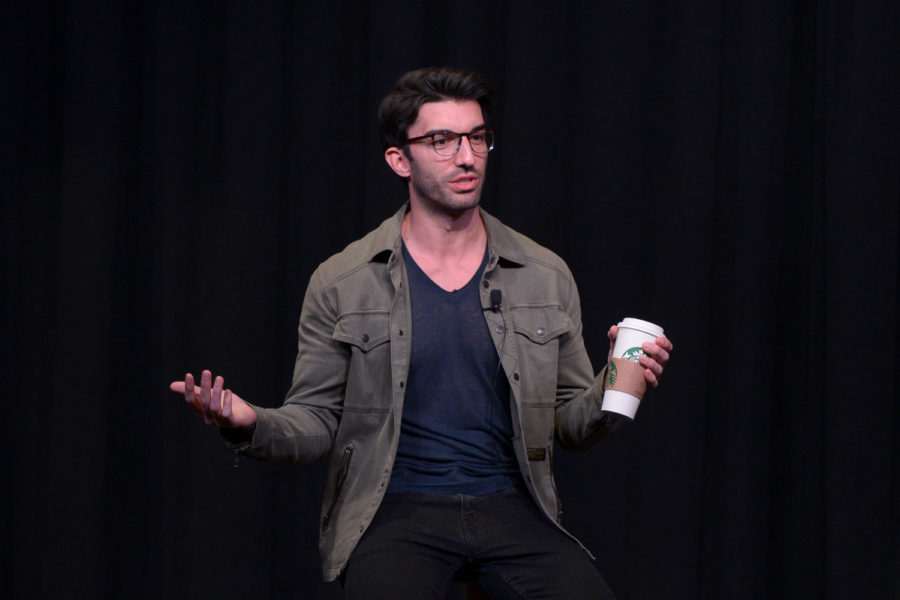Justin Baldoni is a self-proclaimed feminist of the 21st century.
The actor — best known for his role on “Jane the Virgin” — said he knows he is a straight, white, privileged man with a platform, but is using that advantage to rewrite history into a new “herstory.”
“We view the world through the men’s gaze,” he said. “But it’s pretty simple and the fact of the matter is there is an issue with masculinity.”
The American actor, director and filmmaker gave a talk about building female empowerment through redefining masculinity to a packed crowd — which included his mother — to continue Women’s Empowerment Week Tuesday evening in the William Pitt Union. Pitt Program Council partnered with Pitt FEM to host Baldoni and ushered students in from the standby line as the Assembly Room filled to capacity.
Baldoni began the night by applauding the small handful of men in the room who attended, but recognizing that the lack of a male presence was precisely the larger issue at hand.
“You 15 men are probably the smartest men on campus,” he said. “But how do we make it so that next year there’s 100?”
He said while he advocates for women’s rights and a change in the growing culture of sexual assault and discrimination, his work is primarily aimed at transforming men into allies in this struggle.
“I’m sure it means something to the women in this room or to other women to see a man be willing to stand up and champion and use his voice so others can be amplified,” he said. “But really my work is for the men because men need to learn how to be that voice.”
Baldoni said he realized in his 20s how his perception of his own masculinity had been constructed, and saw how it affected his and others’ attitudes toward femininity. He said he had been taught growing up that his identity as a man was defined by his perceived strength, image and use of authority toward both men and women.
“If there was ever a guy that naturally wasn’t like that it was me,” he said. “And yet here I was being socialized thinking that was how I had to be in order to be seen as a man in the world.”
In the Q&A — or “town hall” as Baldoni called it — that followed his talk, he encouraged audience members to ask about whatever was on their minds and hearts.
One audience member who said she worked as a stage manager asked Baldoni about sexual assault in Hollywood and the ways in which the #MeToo movement can work to create an environment for women to be able to let their voices be heard about their experiences.
Baldoni responded by acknowledging that #MeToo is applicable to all industries, and offered hope that the changes spurred by the movement will broker a stronger relationship of respect between men and women in the workplace.
“This begins the new chapter,” he said. “The pendulum swung so far in one direction — which it needed to — that it shattered the glass ceiling, and now it’s got to come back and we have to figure out what this new balance is.”
Krithika Pennathur — a junior triple-majoring in gender, sexuality and women’s studies, English writing and history — asked about the suppression of women’s voices in sharing stories of assault and discrimination. She appreciated Baldoni’s answer, where he described his own failure when he reacted with skepticism about news of a woman accusing a friend of his of sexual assault.
“I know he was very hesitant about his response, but I thought the example that he gave was really powerful,” she said. “It’s always really interesting for me to hear different perspectives on how people answer that.”
Most of the attendees, including junior environmental studies major Roslynne Ravy, appreciated a male speaker despite the focus of the week on female empowerment.
“I think it would be very important that they did choose a male because we all know that women care about women’s issues. “It’s different to focus on individual issues with women because we’ve all been through it, but it’s different when men come out and say something.”
Farrell Healy, PPC’s public relations director, said her committee was concerned about hosting a male figure, but it was out of their hands since this was the only date they could book Baldoni for.
“There was definitely hesitation, we weren’t initially planning on having it during WEW week,” Healy said. “But I think it worked out because he spoke a lot about female empowerment and giving the voice back to females.”
Baldoni himself said both genders are vital to uplifting women’s voices and should work as tools to achieving this, not as barriers.
“At the end of the day if you strip away man, woman, human, we all are just trying to be enough,” he said. “It’s not a political fight it’s a human fight.”


